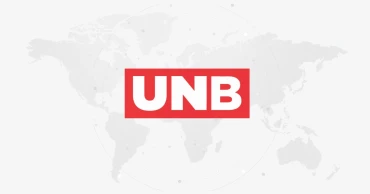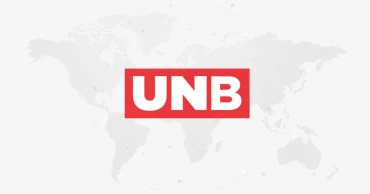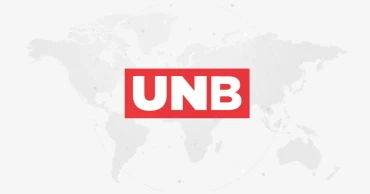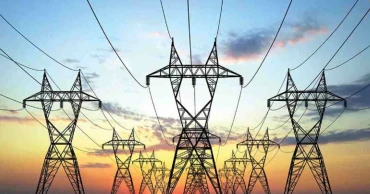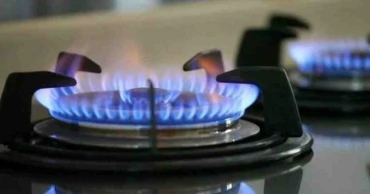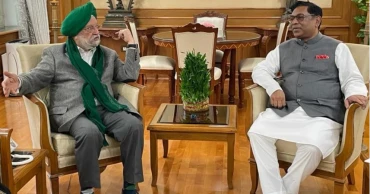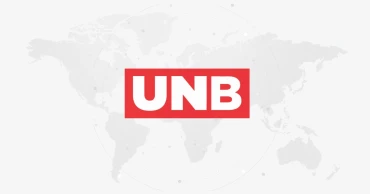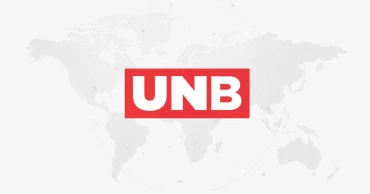fuel
Govt decreases price of petroleum fuels with effect from Sept 1
Bangladesh's interim government has decreased the prices of petroleum fuels at the retail level with effect from September 1.
As per a gazette notification issued by the Energy and Mineral Resources Division on Saturday, the price of diesel and kerosine at the consumer level will be Tk 105.50 per litre, down by Tk 1.25, from the previous price of Tk 106.75.
Price of petrol will be decreased by Tk 6 to Tk 121 per litre, from the previous price of Tk 127.
Read more: Govt's executive authority to raise power and gas prices cancelled through ordinance
Price of octane will also be decreased by Tk 6 to 125 per litre, from the previous price of Tk 131 per litre.
The new prices of petroleum fuels have been set in continuation of every month’s adjustment process under an automatic pricing formula in line with the global market price, said the Energy and Mineral Resources Division.
1 year ago
AL Pledges to Expand Modern Urban Facilities to Every Village in Smart Bangladesh
Ahead of the upcoming 12th National Parliamentary Election, the ruling Awami League has announced its election manifesto, committing to extend modern urban amenities to every village.
The manifesto, with the slogan “Smart Bangladesh: Visible Development, Increased Employment,” was announced by Awami League President and Prime Minister Sheikh Hasina today (December 27, 2023) at the Pan Pacific Hotel Sonargaon in Dhaka.
The manifesto promises to enhance the quality of life in villages by providing improved roadways, communication, clean drinking water, modern healthcare and medical treatment, quality education, advanced sanitation and waste management, increased electricity and fuel supply, computer and high-speed internet facilities, and expanded markets. These initiatives aim to bring all the comforts of modern cities to every village.
In Smart Bangladesh Awami League seeks more safeguards for minorities, end of intolerance
To ensure a reliable fuel supply, the party plans to continue encouraging and supporting the installation of biogas plants and solar panels on a group basis. The establishment of agricultural machinery service centers and workshops in villages will expand rural mechanization services, including machinery repair. This initiative will also provide training for rural youth and agricultural entrepreneurs, promoting productive employment.
The manifesto includes plans for private sector investment and loan support for small and marginal entrepreneurs manufacturing and marketing light machinery. In line with the economic development of villages, cultural, sports, and entertainment programs will be expanded. This approach is expected to reduce the urban migration trend among rural youth by creating self-employment opportunities within villages. The government will fully support young people's involvement in agriculture, industry, and business.
AL Manifesto on Significant Steps to Foster Women Entrepreneurs
Awami League says that during its previous tenure, roads in every upazila were improved and expanded, connecting each village to upazila headquarters and linking upazilas to district headquarters and national highways. Every village has been ensured electricity supply. Drinking water and sanitation facilities have been enhanced and will be further improved. The government has taken over the expenses of primary and secondary schools, and financial support is being provided for teachers' salaries in private schools. Hospitals with 50 beds in upazilas are being upgraded to 100-bed facilities. Community clinics are bringing healthcare services to the doorstep of rural residents. Every union now has computer and internet service centers, providing employment opportunities to rural youth and facilitating communication nationally and internationally.
Awami League’s Manifesto: Mega Projects for Accelerating Economic Momentum
The expansion of communication, electricity, and internet services has accelerated rural production and market systems. Agricultural inputs have become more accessible, and the market for agricultural products has expanded. The extension of agricultural technology and the development of cottage and small industries are being expedited. Activities in both agricultural and non-agricultural sectors have multiplied significantly in rural areas.
2 years ago
Khulna fuel traders start indefinite strike with 3-point demand
An indefinite strike called by fuel traders in Khulna is underway since this morning (September 03, 2023) to realise their three-point demand including hiking commission on fuel sales.
Moving fuel from Padma, Jamuna and Meghna oil depots has remained suspended since 8 am.
Bangladesh Tank-Lorry Owners’ Association, Bangladesh Fuel Oil Distributors Association, Khulna Divisional Tank-Lorry Workers’ Union and Padma, Meghna and Jamuna Tank-Lorry Workers’ Welfare Association are observing the strike.
Their demands include raising commission on fuel sales to at least 7.5 percent, setting the tank-lorry economic life to 50 years, and issuing a gazette notification mentioning fuel traders as commission agents as per previous pledges.
Read: Khulna fuel traders threaten strike from Sept 3 if demands not met
As news of the strike surfaced earlier, a huge number of motorbikes and private vehicles were seen forming queues at fuel pumps in Khulna on Saturday night.
Claiming their demands as logical, Md Muraduzzaman, a leader of petrol pump owners’ association, said they were forced to start the strike from Sunday morning as their demands were not met by August 31.
The strike will end when their three-point demand is met, he said.
Read: Sylhet’s Osmani hospital’s intern doctors call off strike
2 years ago
Khulna fuel traders threaten strike from Sept 3 if demands not met
Fuel traders in Khulna threatened to go for an indefinite strike from September 3 if their three-point demand, including raising sales commission, is not met by August 31.Abdul Gaffar Biswas, president of Khulna District Petrol Pump Owners Association made the announcement after a meeting with fuel traders in the New Market area of Khulna city on Wednesday night.
Sylhet’s Osmani hospital’s intern doctors call off strikeBesides raising sales commission, the other demands are setting the tank-lorry economic life to 50 years and issuing a gazette notification as per the pledges.
Ambulance owners call strike from TuesdayAbdul Gaffar said they have placed their three-point demand several times but the government did not pay heed. That’s why the fuel traders decided to go for an indefinite strike from September 3.
One-Point Demand: Over 200 freedom fighters to observe hunger strike in city Monday
2 years ago
IPPs call for uniform import duty on primary fuels
Removal of discrepancies in the import duties imposed on primary fuels, which are used as inputs in power generation, can reduce the government’s subsidies in the power and energy sector.
The notion is being put forward by the private power producers of the country, also known as IPPs (independent power producers).
They are claiming that the discriminatory import taxes on primary fuels - furnace oil (diesel), coal, and gas (LNG) - ultimately favours the coal-fired power plants that projects the government’s biases towards ‘the dirtiest fuel’.
Currently there is a 5 percent duty on the import of coal, which rises to 34 percent on furnace oil, aka heavy fuel oil (HFO), and 22 percent on gas.
Read more: Ilisha-1 country’s 29th gas field: Nasrul Hamid
As a result, the price per MMBtu (metric million British Thermal Unit) of coal comes to Tk 10-11 and when power is generated from coal, it costs Tk 12-13. After adding 5 percent import duty, the cost of electricity from coal-fired power plants becomes Tk 13-14.
On the other hand, the price per MMBtu of HFO comes to Tk 11-12 and the power generation from the HFO costs Tk 11-12 due to its higher heat value. But when the 34 percent import duty on HFO is added, its power generation cost becomes Tk 15-16 per unit.
In the same way, the cost per MMBtu of imported gas is Tk 11-12 and its power generation cost becomes 10-11 due to its higher heat value. But after adding the import duty of 22 percent, the per unit electricity generation cost from gas-fired plants goes up to 13-14 per unit.
“If the discrepancies are removed from duty regime, and import duty on all fuels is made uniform at 22 percent, the production cost of electricity from diesel-fired plants will be lower than that of coal-fired power plants,” said Imran Karim, former president of Bangladesh Independent Power Producers Association (BIPPA), the trade body representing the interests of private power producers.
Read more: Many big industries using illegal gas connections: Nasrul Hamid
Karim, also the vice chairman of Confidence Group, a leading firm in private power generation, said the duty should be uniform considering the government’s commitment to support cleaner fuels - coal being the original dirty fuel. Furnace oil of course is no better.
“The government will receive more revenue from imported fuels, if the duty on all fuels are equalised,” he added.
According to the Power, Energy and Mineral Resources Ministry’s estimate, in the current fiscal 2022-23, the power and energy sector will require over Tk 23,000 in subsidies to cover its losses.
Of this, the power sector will require Tk 18,000 crore while around Tk 6000 crore would go on primary fuels.
Read more: New PSC: Petrobangla awaits final nods to invite int’l bidding for offshore blocks
Earlier, the loss in the sector was estimated much higher at over Tk 70,000 crore due to the excessive price hike of gas, coal and petroleum fuel following the war in Ukraine that began in February 2022.
But after the enhancement of fuel prices on the domestic market by more than 40 percent pn average and power tariff by more than 15 percent, the losses came down and subsequently the requirement for subsidy was also reduced to around Tk 23,000 crore, said officials at the Ministry of Power, Energy and Mineral Resources.
Private power producers claim that if the import duty on coal and furnace oil were made the same as that on gas, i.e. 22 percent, it would reduce overall costs and thus reduce the subsidy as well.
“Because, the power generation by furnace oil-based plants will automatically go down and it will ultimately have an impact on the overall tariff structure in the power sector by seeping through to both the wholesale and retail levels,” said an IPP plant operator.
Read more: Petrobangla initiates move to end foreign company’s monopoly in pre-paid gas metering system
Power Cell director general Mohammad Hossain said that both coal and furnace oil are dirty fuels, so by the IPPs’ logic, the import duty on these two fuels should be higher than on gas - not uniform.
“The import duty on coal and HFO should be equal and import duty on gas could be comparatively lower as it is the cleanest of the three,” he said.
2 years ago
Gas supply to remain off for 8 hrs in some Dhaka areas, 9 hrs in N’ganj today
Gas supply will remain suspended for 8 hours — from 2 pm to 10 pm — today (March 22, 2023) for all consumers in several Dhaka areas due to emergency work of pipelines.
The areas include Minto Road, Eskaton, Pirbagh, Habibullah Road, Karwan Bazar, Old Elephant Road and areas adjacent to PG Hospital, Paribagh BPDB quarters, Birdem Hospital, Dhaka Club, Holy Family Hospital, Dhaka University and Buet, Titas Gas Transmission and Distribution Company Limited said.
Also Read: Unique's 585 MW Meghnaghat power plant to be ready by Oct, but questions hang over gas supply
In another notice, Titas said that gas supply will remain off on both sides of the Saoghat- Araihazar road in Narayanganj from 8 am to 5 pm for emergency pipe tie-in work today.
Regretting for the temporary inconveniences, Titas Gas authorities said the consumers in adjacent areas may experience low pressure in gas supply.
Read More: Gas explosion at residential, commercial buildings: Common causes and ways to prevent them
2 years ago
Bangladesh wants fuel from India at an affordable price: Nasrul Hamid tells Indian minister
State Minister for Power, Energy and Mineral Resources Nasrul Hamid has expressed Bangladesh's interest to import more petroleum at an affordable price from India.
He conveyed this while making a courtesy call on India's Minister of Petroleum, Natural Gas and Housing, Urban Affairs Hardeep Puri in Delhi.
During the meeting they discussed various issues related to mutual interest.
The Power Division issued a press release in this regard.
Nasrul Hamid discussed diesel import, India-Bangladesh friendship pipeline, Engineers India Limited (EIL), increasing energy cooperation, exchange of experience, training and human resource development, LNG import, offshore gas exploration etc with the Indian minister.
Read more: Fuel import from India through pipeline to start from 2023: PM
He also discussed the overall situation of the energy sector in Bangladesh.
The Indian minister invited Nasrul Hamid to the India Energy Week scheduled for next February.
He said that India will work closely with Bangladesh in the area of energy cooperation.
“If Bangladesh wants to open the energy market, India will extend necessary cooperation,” he said, adding that modernization of petroleum institutes and development of human resources can be done together.
Among others, Power Secretary Md. Habibur Rahman, BPDB Chairman Md. Mahbubur Rahman and High Commissioner of Bangladesh Md. Mostafizur Rahman were present during the meeting.
Read more: “Assurance of getting oil, gas from India big accomplishment of recent visit”
3 years ago
PM seeks Saudi fuel with deferred payment schedule
Bangladesh Prime Minister Sheikh Hasina on Sunday (November 13, 2022) sought fuel from Saudi Arabia, with a deferred payment schedule.
She made the request while the Deputy Minister of Interior of the Kingdom of Saudi Arabia Dr Nasser bin Abdulaziz Al Dawood called on her at her official residence Ganabhaban.
Read more: Bangladesh wants to import petroleum from KSA at lower price: Nasrul
PM’s press secretary briefed reporters after the meeting.
He said that Bangladesh's Prime Minister sought cooperation in oil supply from Saudi Arabia with a deferred payment schedule.
Read more: Saudi Arabia assures assistance in commercial supply of LNG to Bangladesh
3 years ago
Govt working to revise renewable energy policy: Recent primary fuels crisis a reason
The government is working to revise the “Renewable Energy Policy of Bangladesh 2008” to make it more effective in the changed energy and power sector scenario.
Official sources said, Sustainable and Renewable Energy Development Authority (Sreda), the focal organization under Power Division of the government, has already appointed a consultant.
The consultant – Development Technical Consultants Pvt. Ltd (DTCL) – has started reviewing the existing renewable energy policy, REPB-2008, and organize focus group discussion for stakeholders.
Read:Govt deliberately pursuing import-dependent energy policy: Speakers
According to renewable energy industry insiders, the first meeting of the stakeholders will be held on September 20 in Sreda office.
The consultant firm convened the meeting on behalf of Sreda where it will make a presentation on the existing policy and seek opinions of the stakeholders to update it in a national and global changed scenario, said an industry insider.
He said the initiative have come from the government as a follow-up of its statements to 26th meeting of the United Nations Climate Change Conference (COP26), held in Scotland, United Kingdom, from October 31 to November 13 2021.
Read: Experts for reining in energy corruption, exploration of alternative sources
In the COP26 meeting, Bangladesh Prime Minister Sheikh Hasina in written statement said: “We are also working for a more sustainable energy mix. We hope to have 40% of our energy from renewable sources by 2041”.
She also said, “Recently we submitted an ambitious and updated NDC (Nationally Determined Contributions) to the UNFCCC. We have cancelled 10 coal-based power plants worth 12 billion dollars of foreign investment.
Currently, as per Sreda statistics, the country generates about 911 MW (solar 677 MW, hydro 230 MW and others 2 MW) while the total power generation is more than 25,000 MW which shows the renewable energy’s share is less than 4 percent.
Read: Patience can help overcome crisis in energy sector: Nasrul
The recent crisis in primary fuels is another reason behind the move, said a Sreda official.
State Minister for Power, Energy and Mineral Resources Nasrul Hamid, recently at a function, said that among other options of renewable energy, solar power has huge potential for Bangladesh. But since it requires substantial land allocation, it needs an innovative solution.
He also said Bangladesh is now promoting the options of rooftop and floating solar panels and net metering system has been introduced to popularise the use of solar power.
Read Huawei Technologies intends to support RMG industry in renewable energy
“There is a good opportunity to work on wind power as well,” he said, adding that wind mapping has been completed for 9 potential sites and feasibility will be conducted on the potential for offshore wind power.
Private investors in renewable energy sector welcomed the Sreda initiative to review the renewable energy policy and bring necessary amendments to promote non-conventional energy sources.
Dipal Barua, president of Bangladesh Solar and Renewable Energy Association (BSREA), termed the initiative “time befitting.”
Read TEI GET to promote renewable energy in Bangladesh
He said despite a huge potential, the country could not utilize it due to lack of proper action plan.
Munawar Moin, Vice President of BSREA and President of Solar Module Manufacturers Association of Bangladesh (SMAB), said the government should introduce a policy under which the local solar industry could utilise their full potentials.
Cost of solar energy decreased substantially and has created a huge scope for investment in mega projects, he said.
Read Green Economy in Bangladesh: Prospects and Challenges
3 years ago
After hiking fuel price by 30%, Indonesia considering buying cheap Russian oil
Joko Widodo, President of Indonesia, is contemplating buying Russian oil to ease the burden of rising energy prices.
In an interview with the Financial Times, Widodo said, “We always monitor all of the options. If there is the country (and) they give a better price, of course,”
Widodo raised the price of subsidised fuel by 30% earlier this month, citing financial concerns as the reason for the price increase.
Read: Indonesia hikes fuel prices by 30%, cuts energy subsidies
Thousands of protestors gathered last week in Jakarta and other major cities to condemn the government’s decision to reduce fuel subsidies. The 270 million-strong nation was rocked by demonstrations after the decision.
However, any decision to buy Russian crude oil at a price higher than the G7-agreed price cap could result in US penalties against Indonesia.
Sandiaga Uno, Indonesia’s minister of tourism, claimed in August that Indonesia had received a 30% discount on Russian petroleum. The nation’s state-owned oil corporation, Pertamina, then declared that it was examining the risks of acquiring Russian oil.
Read: Special Presidential Envoy for Climate Kerry to visit Greece, Indonesia, Vietnam
Due to rising food costs, Indonesia, the largest economy in Southeast Asia, reported annual inflation of 4.7% in August.
3 years ago

